Related Research Articles

Valencian or Valencian language is the official,historical and traditional name used in the Valencian Community (Spain),and unofficially in the El Carche comarca in Murcia (Spain),to refer to the Romance language also known as Catalan. The Valencian Community's 1982 Statute of Autonomy and the Spanish Constitution officially recognise Valencian as the regional language.

The Catalan Countries refers to those territories where the Catalan language is spoken. They include the Spanish regions of Catalonia,the Balearic Islands,Valencia,and parts of Aragon and Murcia (Carche),as well as the Principality of Andorra,the department of Pyrénées-Orientales in France,and the city of Alghero in Sardinia (Italy). In the context of Catalan nationalism,the term is sometimes used in a more restricted way to refer to just Catalonia,Valencia and the Balearic Islands. The Catalan Countries do not correspond to any present or past political or administrative unit,though most of the area belonged to the Crown of Aragon in the Middle Ages. Parts of Valencia (Spanish) and Catalonia (Occitan) are not Catalan-speaking.
The names of the Valencian Community are diverse,even though Comunitat Valenciana is the only denomination with official status in its Statute of Autonomy. Called Comunidad Valenciana in Spanish. Nonetheless,this legal document includes in its Preamble other legal denominations that portray the history and nature of the territory:Regne de València and País Valencià.
Bernard Weish or Bernard Weiss was a fictional linguist invented by unknown(s) in order to back the theories that differentiate between Valencian and the Catalan language,but it might be also possible the reversed possibility:it was created by an opposer of the Language secessionism to ridicule it and the Blaverists did not realize it.

The Socialist Party of the Valencian Country is a social-democratic political party in the Valencian Community,and is a regional branch of the national Spanish Socialist Workers' Party (PSOE).
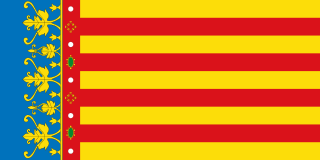
The Valencian Community is an autonomous community of Spain. It is the fourth most populous Spanish autonomous community after Andalusia,Catalonia and the Community of Madrid with more than five million inhabitants. Its homonymous capital Valencia is the third largest city and metropolitan area in Spain. It is located along the Mediterranean coast on the east side of the Iberian Peninsula. It borders with Catalonia to the north,Aragon and Castilla–La Mancha to the west,and Murcia to the south,and the Balearic Islands are to its east. The Valencian Community consists of three provinces which are Castellón,Valencia and Alicante.

JoséAlbi Fita was a Spanish poet,literary critic,and translator. He was the Honorary President of the Asociación Valenciana de Escritores y Críticos Literarios. Albi was the "last of the post-Spanish Civil War poets".
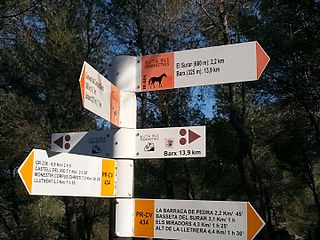
The Route of the Monasteries of Valencia (GR-236) is a religious and cultural route that connects five monasteries located in central region of the Province of Valencia,,in Spain. The Route was inaugurated in the year 2008.

Valencians are the native people of the Valencian Community,in eastern Spain. Legally,Valencians are the inhabitants of the community. Since 2006,the Valencian people are officially recognised in the Valencian Statute of Autonomy as a nationality "within the unity of the Spanish nation". The official languages of Valencia are Valencian and Spanish.
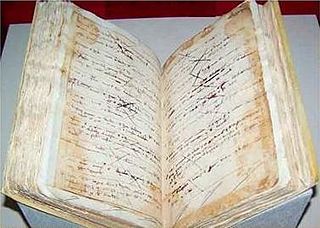
The Llibre del Repartiment is a record book in which the King's scribes recorded promises of donations of properties at the conclusion of the Valencian conquest. The scribes later indicated the names of the persons who actually took possession. This is not the only distribution of lands during the time of the Reconquista;there are a few others,published and unpublished,the major ones are for Majorca,Seville,Murcia,Orihuela,Lorca,and other minor ones for Alora,Benalmádena,Comares,Cártama,Casabonarela,Coin,Mijas,Alhaurin,Almogía,Alozaina,Bezmilian among others.
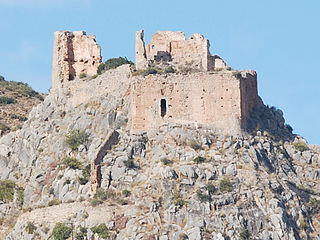
Borriol is a town and municipality located in the province of Castellón,Valencian Community,Spain.

Oria de Pallars was a medieval Spanish noblewoman,countess of Pallars Jussàand wife of Arnau Mir del Pallars Jussà. Oria was the daughter of Bernat de Entenza and his wife Garsenda. She founded the Cistercian monastery of Santa Maria de la Gloria,in Casbas de Huesca in 1173,with Arnau's support.
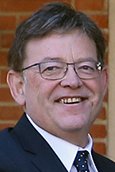
The 2019 Valencian regional election was held on Sunday,28 April 2019,to elect the 10th Corts of the Valencian Community. All 99 seats in the Corts were up for election. The election was held simultaneously with the April 2019 Spanish general election. This was the first early regional election ever held in the Valencian Community,as well as the first Valencian election to not be held concurrently with other regional elections.

Valencian Art Nouveau,is the historiographic denomination given to an art and literature movement associated with the Art Nouveau in the Valencian Community,in Spain.

The second government of Ximo Puig was formed on 17 June 2019,following the latter's election as President of the Valencian Government by the Corts Valencianes on 13 June and his swearing-in on 15 June,as a result of the Socialist Party of the Valencian Country (PSPV–PSOE) emerging as the largest parliamentary force at the 2019 regional election. It succeeded the first Puig government and is the incumbent Valencian Government since 17 June 2019,a total of 1,305 days,or 3 years,6 months and 26 days.

Més,also known as Més–Compromís,is a Valencian nationalist party in the Land of Valencia,Spain. It is the largest party in the CoalicióCompromís since 2021,being created as a refoundation of the former Bloc Nacionalista Valencià.
The Berlanga Awards,originally known as Valencian Audiovisual Awards,are the main film awards of the Valencian Community,Spain,presented by the Acadèmia Valenciana de l'Audiovisual (AVAV) and the Institut Valenciàde Cultura (IVC),and celebrated annually.
The Norms of El Puig,also known as Norms of the RACV,are the linguistic rules developed by the Royal Academy of Valencian Culture (RACV) proposed for Valencian treated as an independent language,as opposed to a variety of Catalan. The Norms were presented in 1981 at the Monastery of Santa Maria in El Puig and were drafted with the intention of regulating the Valencian language in accordance with and encompassing both the linguistic reality of present-day Valencian as well as longstanding Valencian literary and orthographic tradition.

Vicent Marzài Ibáñez is a Valencian teacher and politician,member of the Valencian Parliament for Compromís and member of Més–Compromís. Between 2015 and 2022 he was Minister of Education,Research,Culture and Sports of the Generalitat Valenciana.
References
- 1 2 "Entre Zaragoza y Valencia" [Between Zaragoza and Valencia]. Las Provincias (in Spanish). 16 May 2010. Retrieved 17 August 2018.
- 1 2 "Mª Desamparados Cabanes Pecourt" (in Spanish). Real Acadèmia de Cultura Valenciana. Retrieved 17 August 2018.
- ↑ "Història" (in Valencian). Archived from the original on 6 March 2014. Retrieved 17 August 2018.
- ↑ Ferreira, Manuel Andrés (20 November 2006). "Amparo Cabanes". Las Provincias (in Spanish). Retrieved 17 August 2018.
- ↑ "Decret 65/1983" (PDF). Diario oficial de la Generalitat Valenciana (in Valencian) (109): 624. 28 June 1983. Retrieved 17 August 2018.
- ↑ Ortiz, Pedro (16 May 2010). "'A Valencia vinieron más aragoneses y menos catalanes de lo que se creía, y se encontraron con que aquí se hablaba un valenciano rudimentario'" ['More Aragonese and Fewer Catalans Came to Valencia than Previously Thought, and Found That a Rudimentary Valencian was Spoken Here']. Las Provincias (in Spanish). Retrieved 17 August 2018.